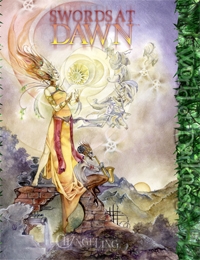The Adjudicators of the Wheel are firm believers in the principles of fairness and justice. They look at the inequalities in the world and are filled with the need to balance the scales. However, the Judges do not believe in spreading wide-scale social change, at least not by themselves. Instead, they function on a much more personal level. Adjudicators are silent observers and meddlers, a cabal that bears witness to actions and metes out punishments or rewards as they see fit, and takes care that neither their beneficiaries nor their victims can trace their sudden shift in fortunes to anything but simple chance.
Mien
Adjudicators prefer a simple look, the less ostentatious the better. They also tend towards clothing that conceals detail; heavy coats, low-pulled baseball caps, and scarves in the winter — anything that will help cover their features without standing out. Many are masters of disguise, and use hair dyes, contact lenses, and the like to observe their targets in a variety of guises without being discovered.
Whatever their natures, however, all of the Judges develop a few traits that give them away to changelings and, at higher Wyrd, can hint at their natures to others. The eyes of the Judges never match; most often, one eye turns blue while the other becomes a shade of deep grey, but other color pairings have been known to occur. In time, even the whites of their eyes change slightly, with the one becoming a brighter white and the other seeming almost a dirty grey. In addition, the hands of the Judges change as they grow in power — the left hand becomes increasingly lined, looking old and worn, while the right becomes smooth and uncalloused, with its lines barely visible. This trait carries over to any gloves or rings that a Judge might wear, leaving the left looking old and worn, and the right shinier and new.
Fortune's Wheel (Privilege)
A Judge may choose to activate Fortune’s Wheel whenever she uses a power of the Contract of the Hearth; this increases the cost of the Contract by a point of Glamour. In doing so, she “stores” a Contract activation that opposes the one that she has enacted, and may trigger it against a second person later in the day.
Upon activation, Fortune’s Wheel creates an effect that is the opposite of the one provided by the initial Contract, as follows. Fickle Fate and Favored Fate simply reverse, with the former granting a +4 die bonus to its second target, and the latter applying a –2 die penalty. Beneficent Fate downgrades the subject’s next exceptional success into a standard success. Fortuna’s Cornucopia causes one target to lose the 10-again rule and have their 1s removed from successes on a single roll, and Triumphal Fate causes a single extended action to end disastrously, causing a dramatic failure on the first roll for an extended, non-resisted action.
Three special rules apply to the activation of Fortune’s Wheel. If the character does not release her Fortune’s Wheel within one day, it will automatically release targeting whomever she used her initial Contract on. Furthermore, Fortune’s Wheel cannot be used on a given target more often than the usual rules for each level of the Contracts of the Hearth — an attempt to do so will cause it to backlash onto the initial target in the same way. Finally, the character may only enact this Privilege once per day, which means that she can only have one Fortune’s Wheel prepared at a time.
Joining
If a potential member asks to become an arbiter, he must consent to have his entire life examined. The Adjudicators gather and study every aspect of the applicant’s history and current situation. They are particularly interested in seeing how the applicant has dealt with the challenges and difficulties of his life, and with how actively and openly he uses his Contracts. If they decide that an applicant has been insufficiently subtle or overly partial in his life, they deny his application outright.
If an applicant is deemed sufficiently skilled and appropriately behaved, the Judges will gather him and run him through a series of tests, during which he must study situations and identify the best people to aid or stymie. Explanations are required, and the methods by which the hopeful makes his decisions are every bit as important as the decisions themselves — the Judges prefer careful study and insight over hunches or magic. At this time, the Adjudicators meet alone, and vote on whether to allow the newcomer to join.
If accepted, new candidates must attend a ceremony alongside the freehold’s current Judges, in which they swear to always work to balance the Wheel of Fortune, and to be impartial in their judgements.
